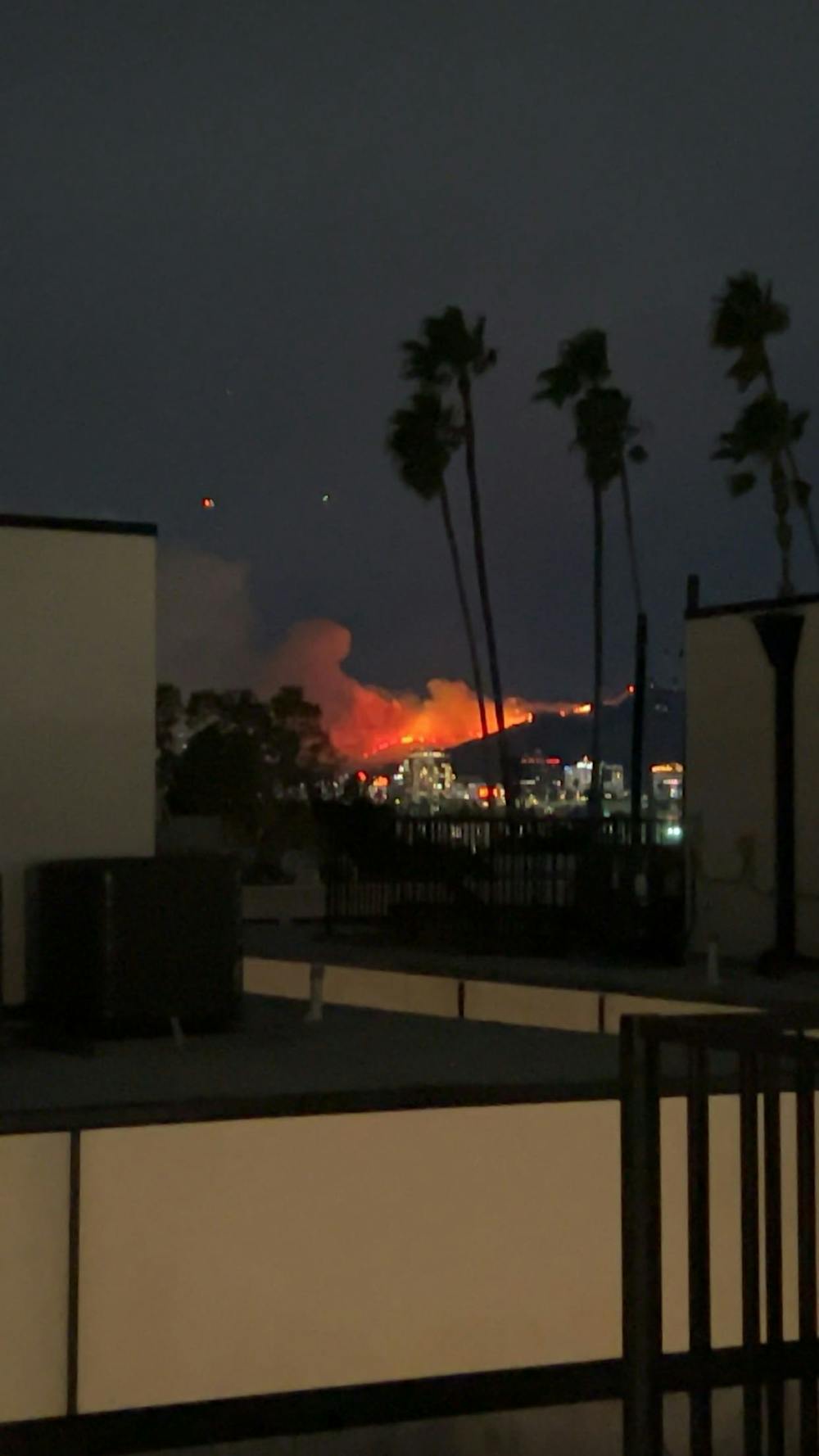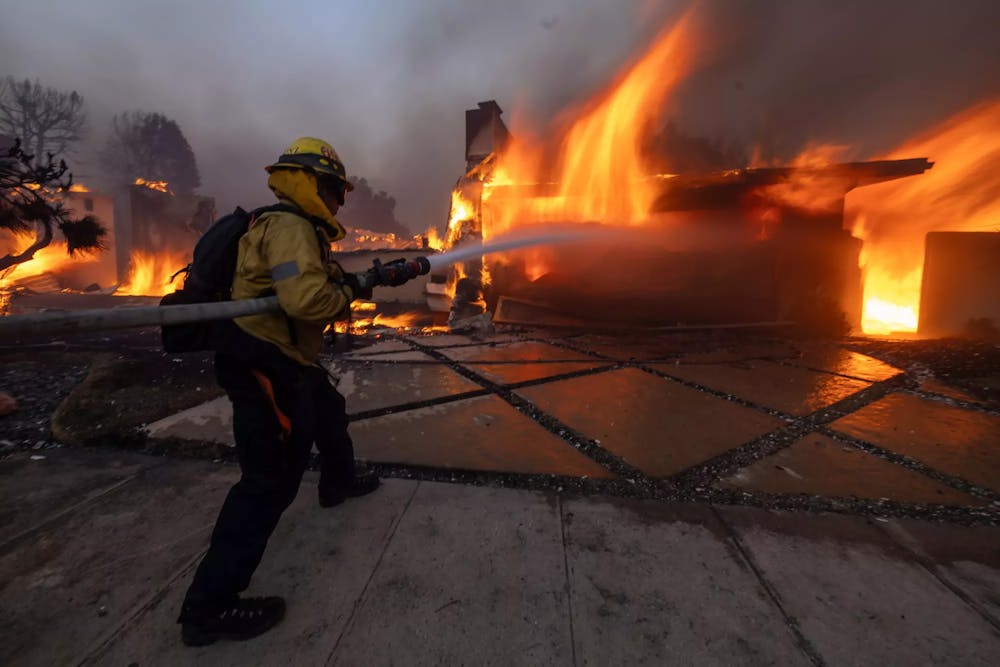In a swift 30-minute decision, sophomore Sarah Hanchey’s professors told their students to grab the small bag they were told in advance to pack — they would be evacuating from the Elon in Los Angeles campus on Jan. 8. Hanchey was left scrambling in frustration as she packed only a fraction of what she brought, leaving behind some clothes, toiletries and the boots she got for Christmas. Her and her classmates drove an hour south to Irvine, which had the closest hotel with a vacancy capacity to fit their 10-student class.
Hanchey recalls before they evacuated, going up to the roof of the LA campus and seeing the beautiful hue of a pink sunset become enveloped by smoke. A North Carolina native, Hanchey now faced a reality she was never accustomed to, wearing masks due to risk of asbestos contamination and seeing fires in the distance destroy and affect many people’s lives.
“It just put a damper on the whole trip,” Hanchey said. “Now it's not like we can just be out enjoying LA, looking at all the views, because people literally blocks away have lost their homes.”
Since the fires started in southern California on Jan. 7, at least 27 people have died and thousands have lost their homes.
Between students and faculty in LA, who call California home or are visiting for winter term courses such as BUS 1110: Gateway to business in Los Angeles and GBL 2015: The Film Festival Experience: Hollywood & Sundance, Elon students and faculty are grappling with the effects of the Los Angeles fires.
A business trip turned south
On Jan. 17, Hanchey and the rest of her class resumed their normal itinerary. During the evacuation, they spent their days taking their classes in Irvine and exploring the city. As Hanchey entered Los Angeles yesterday to tour company spaces, it wasn’t the same. Now the areas she and her peers had visited before the fires are unrecognizable.
“There's a lot of grief,” Hanchey said. “I feel really lucky that I get to go back to North Carolina, and we won't be affected at all.”
Hanchey said the class has unintentionally shifted in focus from the course content to discussions about how they are feeling. For Hanchey, she said she feels as if she is living two realities — one where she is trying to make the most out of her trip and the other of watching people who are staying at the same hotel as her, worried that their home is gone. Hanchey said this is an experience she will never forget.
“I just hope people at Elon realize we were here,” Hanchey said. “But I also don't want it to be about us, we're not the victims here. The Elon students are perfectly fine and we don't want people to feel sorry for us. We want the focus to be on all the people who are actually harmed.”
On Martin Luther King Jr. Day, Hanchey and her classmates will be volunteering in the LA area to help those in need.

Just a girl from Crestview
Sophomore Miri Pottebaum was born and raised in Los Angeles and decided to stay at home for winter term. Often, growing up her parents would drive her and her siblings through the Pasadena area and show them the apartment where Pottebaum lived as a baby before they moved out. The area is where her father went to graduate school and now it's was all up in flames.
Pottebaum said wildfires like these are no surprise to her. She said usually these fire sprout in the mountainous area, free of human interaction, but this all changed as she began seeing pictures of the Palisades. She remembered spending her summer days driving down to the beach through there with her friends. Though she wasn’t affected by the fires, her friends were forced to evacuate and she was worried for her immediate family who were closer to the fire zones than she was.
“Everything was just way more drastic than normal,” Pottebaum said. “I think the reason that this is so big is because it's not the same fires that we have every year. It's very unsettling in that way.”
She said she’s had a desire to help since the fires started, but the rise of people lending a helping hand has possibly left the community overwhelmed. She said donation centers have had to turn away donations due to reaching their maximum capacity. Pottebaum said it’s also unsafe to visit burned down sites due to possible chemical exposure. Never facing a natural disaster to this degree before, Pottebaum said that she is facing a new reality.
Her family is thinking about fostering a dog, because animal shelters are overcrowded now more than ever, which was something she said she had never thought of in times of crisis. Pottebaum’s mother is a teacher, so lately the discussion of burned down schools has been a topic at the dinner table. Pottebaum said she never thought about the impact that would have on the community until now.
“I can't even comprehend how many people have lost their homes and stuff,” she said.
Despite this, friends, roommates and even Hillel, which she is involved in, reached out to her to ask about her safety. Pottebaum said she is hopeful through it all. She is in awe at how her community has come together to pitch in any way they can.
As winter Term comes to a close at Elon, Pottebaum said it is going to be “strange” to leave California but is grateful that her family is safe.
A man with a plan
Director of Elon in Los Angeles Brad Lemack sits in Snow Atrium wearing a multicolored swirl designed tie. His white hair is swooped up into his usual updo and because of his white hair, it glows are the sun shines through the atrium. Instantly he gets the people around him to laugh, specifically a student who is thinking about participating in the Elon in LA program this summer.
Months ago, he had already planned this brief two day trip to Elon’s campus as an effort to recruit students for the summer program. Before boarding his plane that was destined to North Carolina, Lemack wouldn’t have imagined helping student evacuate the Elon in LA campus days before.
Once he got to Elon, his original meetings quickly shifted to a new agenda: Was it safe to continue the LA program this upcoming semester? That became the priority of his trip, to reevaluate the program and make sure it was safe for students to study there. Lemack said for now, it is, but not with a few adjustments such as a new community service plan.
Every semester the Elon in LA campus partners with a nonprofit organization called the Hollywood Food Coalition, but this semester Lemack says they are expanding their outreach by partnering with more organizations. Lemack said this is important in order to get Elon students to be apart of the community and play a role in the rebuild.
“I'll be back in March, so I'm hoping I'll have a lots of happy stories from this new semester,” said Lemack.
Despite his positive nature, Lemack said it is devastating to see the people in the city he has called home for decades face this much loss. He’s known at least eight families personally who have lost their homes.
“My compassion goes for them and to them,” Lemack said. “I don't know how you begin to wrap your mind about starting over, but they will, because they're resilient.”
He said the Elon in LA location is in the Preserve in Hollywood which is an area that holds historical significance. It also in a fire awareness zone. Lemack said when it was time to evacuate students, he called a multitude of hotels who were all booked by residents looking for their own place to stay. Finally, he found a hotel 55 miles south from LA in Irvine. This is where Hanchey and her classmates are staying.
For Lemack, he said everybody in LA has been impacted in different ways. As he braced for his return to LA, he said it all felt surreal.
“It is an emotional wrap around all of Southern California that I think everybody is feeling, and it's difficult to know what to do, except to try to do the right thing, to help in any way that you possibly can,” Lemack said.
Rebuilding together
Even though LA is not out of the woods yet, what is crucial is that everyone, whether it is being in LA or across the country attending a small liberal arts university in Elon take a role in the rebuild. Donations can be an important selfless act in helping, according to LeMack.
“Communities have been devastated,” LeMack said. “I can walk to these areas. Supermarkets are gone. Small businesses are gone. So many people don't have jobs to go back to.”
A devastating loss that Hanchey and Pottebaum said could have potentially been prevented. Hanchey said it might be crucial to talk to people and advocate that this should never happen again if people better their actions against climate change. Pottebaum said wildfires are mostly common in November, and a fire of this caliber is not normal during this time of the year.
Even so, Lemack said he wished it was on better circumstances, but “the greatest disasters bring out the best kindness.”
Abigail Hines contributed to the reporting of this story.


